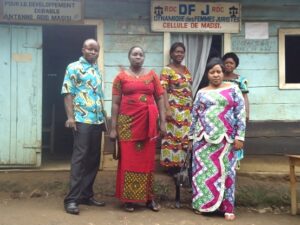
By Claudine Tsongo
‘Without justice, we will never move forward in Congo. Without accountability and the rule of law, the Congolese people – and above all, Congolese women – will never be able to realize their full potential.’
I’m a lawyer and I’ve seen first-hand how Congolese women, particularly those from rural areas, are disadvantaged and discriminated against by our justice system. Limited access to legal services is an obstacle to progress and development in the Democratic Republic of Congo (DRC).
I wanted to be a lawyer for as long as I can remember – the day I passed the bar exam is one of the proudest and happiest in my life. I soon came to realize, however, that I had a responsibility to do more and to take action to increase access to justice for vulnerable women.
In 2002, with a small group of women lawyers here in Goma, I set up the Women Lawyers Movement (la Dynamique des Femmes Juristes, or ‘DFJ’). We provide legal assistance to vulnerable women in communities across North Kivu, free of charge, with teams of paralegals and lawyers working out of our rural legal clinics. With ECI’s investment and capacity-building support, we work to protect women’s rights through the Congolese legal system.
One of the most pressing legal concerns for Congolese women is the frequent denial of their right to own land. Faida, based in rural Masisi, has benefited from the assistance of our dedicated and passionate team in a land rights dispute. Her grandfather, who passed away in February, had produced tomatoes and onions on his farm all his life and provided a stable source of income for the entire family.
‘It’s my dream to continue his work, to continue to farm this beautiful land which has such history with my family. The produce of these fields can provide for my children for the rest of my life’, said Faida.
Faida’s cousins, Timothee and Muhirwa, however, disputed her right to inherit her grandfather’s land. ‘After the local tribal chief denied their appeal, Timothee and Muhirwa took their case against Faida to the Grand Tribunal in Goma.
It was at this stage that our team at DFJ stepped in. We worked with Faida to build her case and support her with the trial. We were delighted that in March, the Grand Tribunal ruled in favor of Faida’s freedom to own, manage and farm the land she lawfully inherited from her grandfather.
‘I am incredibly grateful to DFJ for their support’, said Faida. ‘This ruling will make a big difference in my life, and the life of my kids – these fields will help pay their school fees, and provide food for my family. Never stop fighting for the rights of forgotten women.’
Claudine is the Director and Co-Founder of Dynamique des Femmes Juristes (DFJ). Claudine grew up in Goma and has been a lawyer for eight years, working to protect the rights of vulnerable women.
